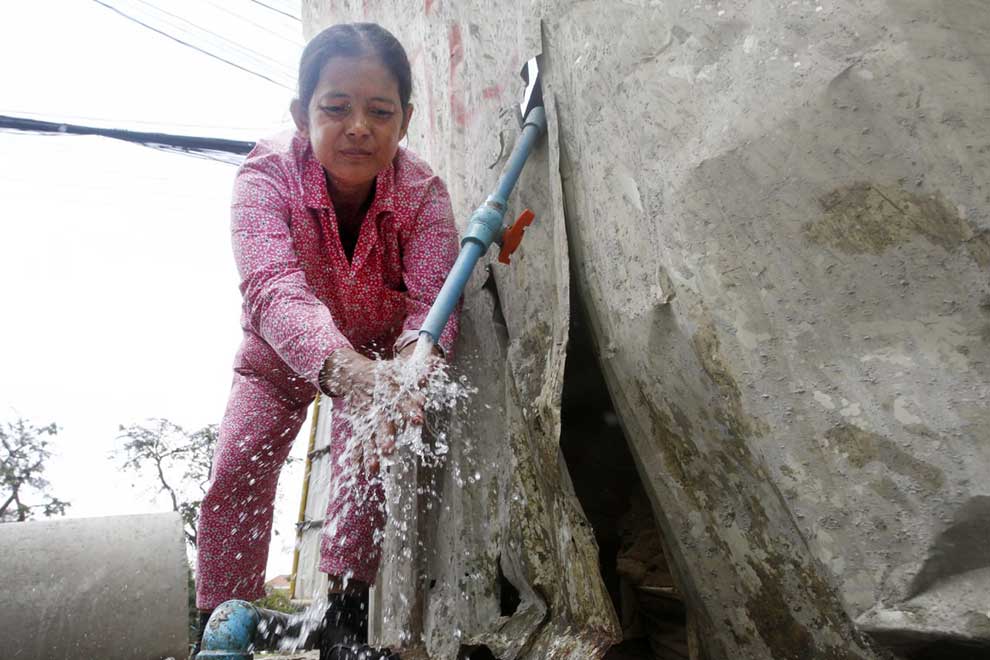
A woman washes her hands with clean piped water in Phnom Penh’s Daun Penh district in January. Heng Chivoan
Picture the global climate crisis and you might think of dry, cracked earth, groaning for water. Or heavy rains and surging rivers sweeping away entire villages.
Climate variability has long been a reality for many communities across the globe; but today they are being battered by fiercer and more unpredictable weather events.
According to a report by the Intergovernmental Panel on Climate Change (IPCC), our climate crisis is primarily human-induced, pushing nature and human-made systems beyond their ability to adapt.
The good news is that since the problem is human caused, it can also be human solved. But our resiliency and survival depend heavily on how we manage water and sanitation.
Ninety per cent of climate problems are water related, including floods, droughts, and deteriorating water quality. Already, nearly 40 per cent of the global population, or a staggering 3.5 billion people, are highly vulnerable to their impact. That number is expected to exponentially increase over the next few decades.
Many climate vulnerable countries have some of the lowest levels of access to water and sanitation in the world.
Over two billion people worldwide, or 1 in 4, live in countries where water supply is inadequate. Half of the world’s population could be living in areas facing water scarcity by as early as 2025. The declining water supply impacts the ability of 3 in 10 people worldwide to wash their hands, which the World Health Organisation has identified as a primary line of defence against Covid-19 and other infectious disease.
In rural Cambodia, only 18.37 per cent of Cambodians have access to safe drinking water, and just over 57 per cent of urban Cambodians have access to safely managed drinking water.
It also impedes water reliant sanitation systems, such as flush toilets and sewers, and drives open defecation, which is practiced by 673 million people. To make matters worse, less than half of the world’s population can rely on a toilet that is connected to a system that safely manages human waste. Many people use hanging latrines or pits that empty into rivers or lakes, contaminating water sources used for drinking, cooking and cleaning.
This can have severe impacts on human health by causing outbreaks of water and vector borne diseases. Already at least two billion people globally use contaminated drinking water, putting them at risk of contracting cholera, dysentery, typhoid and polio, which places costly strains on national health systems.
In Cambodia, 25.45 per cent of the rural population is still practicing open defecation.
Human waste left outside and untreated also produces methane and nitrous oxide – harmful greenhouse gas emissions which contribute to global warming. Capturing those emissions through strategic sanitation management can provide a renewable energy source, turning treatment facilities into net “Zero Energy” users, which can even produce enough excess energy to service nearby businesses or homes.
Recycling wastewater can also reduce critical water shortages. Yet nearly 80 per cent flows into our ecosystems untreated. For example, extreme weather events like heavy rains and floods can overwhelm underprepared sanitation systems, spilling billions of gallons of sewage into local waterways as well as our oceans, posing a public health risk and destroying vital ecosystems.
Investing in water and sanitation to reduce the impact of climate change will be high on the agenda at the Sector Ministers’ Meeting, which will be hosted in the Indonesian capital Jakarta on May 18-19 by the Sanitation and Water for All (SWA) partnership – of which the Cambodian government is a partner – UNICEF and the Indonesian government. Attending the event will be government ministers of water, sanitation, environment, health and economy, including Minister of Rural Development Ouk Rabun and Minister of Environment Say Samal.
Our government leaders’ success will depend on how quickly we can implement mitigation strategies – targeted at reducing global warming – and adaptation plans – which will build community resilience to extreme weather events.
When it comes to adaptation, ensuring our infrastructures are more resilient to climate change will help us increase water availability in times of scarcity, shore up sanitation systems against flooding and other extreme weather, and protect our health, food and livelihood security.
Yet currently, only five per cent of total global climate funding is spent on climate adaptation. Most of that money is directed towards large infrastructure and in mostly urban areas, even though 80 per cent of the extreme poor and 75 per cent of the moderate poor live in rural areas.
SWA partners are calling for governments and businesses to not only increase their financial commitments to climate action, but to allocate 50 per cent of climate financing to adaptation.
As Covid-19 response depletes limited budgets, policymakers may be hesitant to increase investments in water and sanitation. Yet estimates show these investments provide benefits 21 times greater than their initial costs. This means that trillions of dollars could be made available, all while promoting health and sustainable environmental practices.
Channelling that money into climate adaptation would reap economic benefits and help us to leave no one behind in our race to stop the devastating effects of climate change.
We have the necessary tools to pull ourselves out of this crisis. Wise management of water and sanitation can relieve the burden of climate change on communities worldwide, particularly those most vulnerable. But we must act now we are to stop the clock on the planet’s deterioration.
Catarina de Albuquerque is the CEO of Sanitation and Water for All (SWA).







